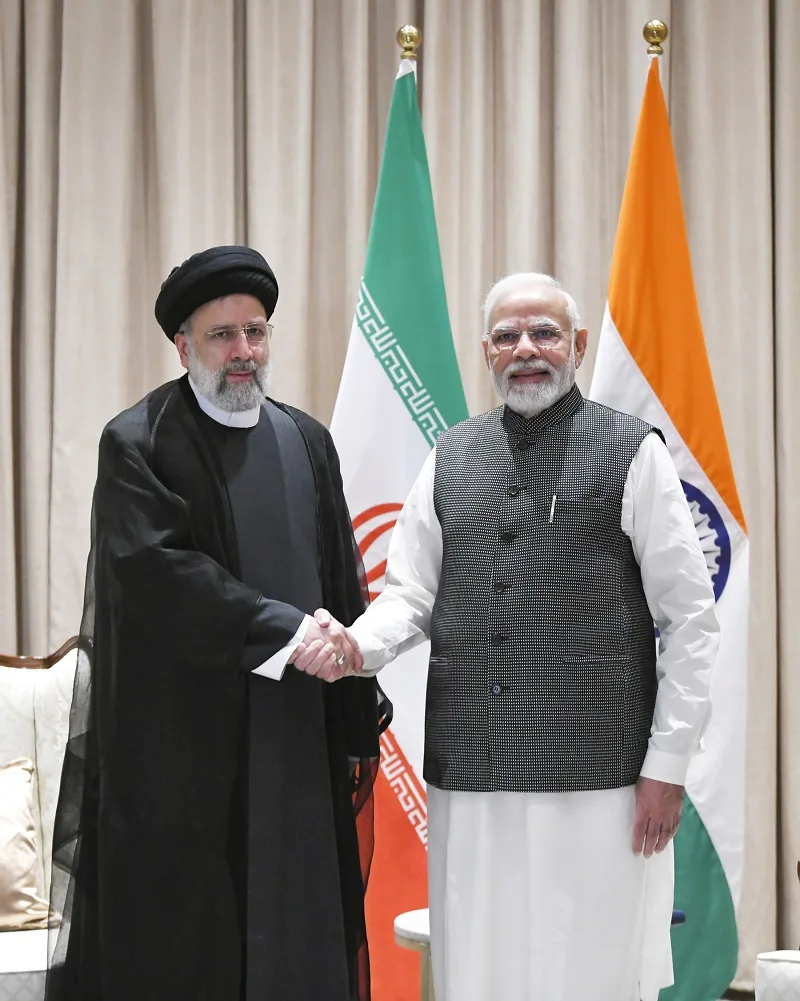

Prime Minister Narendra Modi with Iranian President Ebrahim Raisi in Samarkand (Image courtesy: PIB)
Amid a new emerging world order, India is not only looking at resetting its trade and economic ties with Iran but is also keen to use it as a commercial transit hub. “In addition to bilateral trade and investments, India is interested in using Iran’s commercial transit capacity due to its geographical location,” India’s Ambassador to Tehran Rudra Gaurav Shresth said, adding that trade and economic activities between the two countries have expanded in the last few years despite the US sanction on Tehran.
Experts said that the Israel-Hamas conflict should not be allowed to dampen India-Iran ties and New Delhi must continue its focus on connectivity.
Iran, which is strategically located, can provide easier and seamless connectivity between India and Europe. It provides access to the landlocked Central Asian nations through its corridors as well.
Both the countries have now pressed the pedal on the Chabahar Port project after much delay. The 7,200 km long International North South Transport Corridor (INSTC) is also expected to boost India-Iran ties and push trade between the two. Once the route is fully operational, Iran’s role as a transit hub will become amplified. According to Tehran Times, Iran will then be able to earn $20 billion in transit profits annually, something helping it reduce its dependence on oil revenues amid the American ban on the sector.
Meanwhile, Iran has indicated its interest in inking a Preferential Trade Agreement with India.
Hossein Selahvarzi, Head of the Iran Chamber of Commerce, Industries, Mines and Agriculture (ICCIMA) who met Shresth noted that issues related to high customs tariffs and financial transfer that cause roadblocks in trade need to be resolved at the earliest.
Iran is among the six countries that have been given a go ahead to be part of the BRICS (Bazil-Russia-India-China-South Africa) bloc. Iran is also a full member of the Shanghai Cooperation Organisation (SCO).
In August, Prime Minister Narendra Modi held a bilateral meeting with Iranian President Seyyed Ebrahim Raisi on the sidelines of the BRICS summit in South Africa to discuss matters of bilateral and regional importance including connectivity and trade.
That apart, several high profile visits of officials of both nations have taken place too.
National Security Advisor Ajit Doval who visited Tehran in May met Raisi and discussed issues relating to connectivity and trade. Deputy NSA Vikram Misri too undertook a visit to Iran soon after. Several senior Iranian ministers including its Minister of Defence and Armed Forces Logistics Brigadier General Mohammed Reza Gharaei Ashtiyani and the Deputy Agriculture Minister Mohammad Mehdi Borumandi have paid a visit to India.
Raisi has underlined the need to take India-Iran ties to a “new level” especially with a focus on economic and commercial engagements.
Until 2018 – when the US sanctions kicked in, Iran was one of the primary oil suppliers for India. “For New Delhi, letting go of Iranian crude supplies was a difficult transition as it moved to other suppliers such as Saudi Arabia, Iraq, and as far as Nigeria and Angola to spread its energy import risk,” Observer Research Foundation said.
Also read: Why Iran holds the key in deciding the fate of the Hamas-Israel conflict
Union Minister of State for External Affairs and Textiles, Pabitra Margherita, visited Eswatini, where he…
India and Fiji held their first Joint Working Group (JWG) meeting on defence cooperation in…
External Affairs Minister S Jaishankar on Thursday met a delegation of special envoys from the…
Amnesty International has issued a report demanding the immediate and unconditional release of detained leaders…
India on Thursday dispatched a consignment of 300,000 doses of Measles and Rubella vaccines, along…
At least four people were killed and dozens injured in violent clashes between law enforcement…